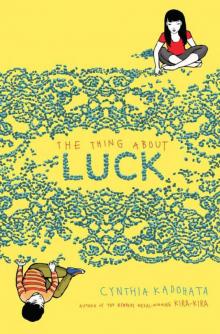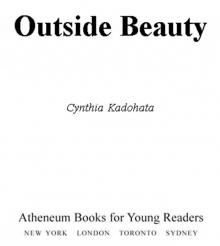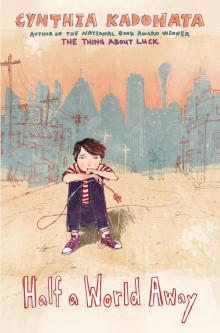- Home
- Cynthia Kadohata
A Place to Belong Page 2
A Place to Belong Read online
Page 2
“So? Hey! It feels like the ship is moving.”
“It is. You have to get up.”
“Why?”
Hanako hesitated. “Because . . .” But there was really no reason. So she added, “Well, never mind.”
He closed his eyes again. Once, Mama had taken him to the doctor to see why he slept so much. But the doctor had just said that some children slept more than others. After he seemed asleep, Hanako spotted a group of kids by the door. She rushed over and immediately cried out, “I’m Hanako!”
They glanced at her, then a girl said, “We’re not supposed to go anywhere, but we’re going anyway! Come on!”
They sped through the doorway all at once. Hanako hesitated for just a second, then ran after them. It was suddenly just like in camp, where the kids went wild and the parents couldn’t control them. They stormed up some very steep stairs, hardly looking where they were going. Hanako’s face felt hot with excitement, just like that time they threw the bottles. Energy! She had so much energy!
She and another girl glanced at each other excitedly as they reached a different deck and sprinted down a long, long, narrow hallway. All that mattered was running! She didn’t even know these kids, but at the moment they were all one single entity. They reached a door and stopped—altogether. A boy flung it open, and one by one, they stood in the doorway and stared.
A bunch of soldiers were sitting around a table playing poker, and there was real money in the center of the table. More money than Hanako had seen in a long time. She thought soldiers didn’t get paid that much. They were big and looked strong. They gazed curiously at Hanako and the other children, and Hanako gaped at them. She tried to put her finger on why they were so . . . surprising. It was just that they were so different from her. You only needed to look at them to see they had lived totally different lives from hers. And not that long ago, maybe they could have been guards in her camp.
Then the boy who’d opened the door called out “Hakujin!” and slammed it shut, and they all ran away laughing hysterically. Hakujin meant “white person.” They would not have dared to call out such a thing in camp. But they were no longer in camp.
Hours later, lying down again, she thought about seeing those soldiers and remembered something Papa had said about Mr. Taylor when he was very angry. She didn’t remember his exact words, but it was something like, “Mr. Taylor has a life. He was a baby once. Maybe he has children, maybe not; maybe he will someday. He has hard days and easy days. He has emotions. These are the things that keep me from killing him.”
That was pretty shocking coming from a restaurant owner who had never hurt a fly. But that was Papa in camp.
And so. Those soldiers had a life. Maybe they had children, maybe not; maybe they would someday. They had emotions; they had been babies once. Just like her, really. Just like her.
CHAPTER
THREE
The next morning Hanako woke up smelling vomit and immediately retched. She realized that the ship was going up and down. It seemed to be swinging wayyyyy up and then wayyyyy down. Hanako knew exactly what was happening: the ship had left the harbor and was now in the ocean, and she was seasick. She leaned over the bed to retch more, trying to cough something up, but nothing came out. Then she couldn’t stop gagging, over and over, like she wasn’t in control of her body. It felt like a demon had taken her over!
“Mama!” she shouted. “Akira!”
Nobody answered, but she thought she saw the outline of her brother’s body above her. “Akira!”
“Shut up!”
So he was sick too. She had a sudden, desperate desire to get up and check on him, but there was nothing she could do, because she felt like she was on the verge of vomiting again.
“Hanako!” Mama was kneeling down, literally holding her own eyes open with her fingertips. She looked like she was insane!
“It’s going to be rough seas all the way!” Mama blurted out. “I must lie down! There are people who can help you!” Then Mama leaned over and went “HAHCH!” Then she gagged. Then she fell into her bunk, which was also on the bottom, directly across from Hanako’s.
The smell of throw-up was overpowering. Hours passed, or maybe it was minutes. Hanako closed her eyes, but all she saw in her mind were chaotic lights. She badly wanted to sleep—there was nowhere else besides sleep where she could go to feel better. She wished she knew what time it was, but on the other hand, what difference did it make?
She lived in a daze that wouldn’t end. Sometimes she slept. Sometimes she cried. Sometimes someone who wasn’t sick brought her food and water.
Sometimes, through the spinning, she thought of her brother and tried to will herself to feel better so that she could help him. But it was so hard to concentrate on feeling better. It was so hard to think. So she tried to concentrate on something that focused her mind and woke her up in camp: an anger that she always felt in her fists. She would squeeze them so long that her forearms hurt. But here, now, she could barely even close her fingers. She was too weak. She was trapped. She would rather die than live like this forever, but she kept murmuring to herself, “This will pass, this will pass.”
And yet it didn’t pass.
CHAPTER
FOUR
And then it did. One day Hanako opened her eyes and felt . . . nothing special. And she knew exactly what had happened—the ship was no longer in the ocean. She had lived all her life in America, and then she had spent the last two weeks in a dizzying half-world between America and Japan. And now she was in Japan! She had to be!
Women and children were milling about. Mama was standing up chatting with another woman, and Akira was laughing as Mama held him. None of it seemed real. Hanako tentatively stood up and still felt fine.
“Good morning, Hanako,” Mama called out, exactly as she might have on any other day.
“Hello?” Hanako replied like a question. Mama held Akira as if he were an infant, his hands around her neck the way he liked to do when Mama felt like babying him.
Mama nodded at the floor. “I brought you a tray of food from the mess hall. I didn’t want to wake you.”
Hanako stared at the food for a moment, then fell upon it and didn’t bother with the fork, just picked up the eggs in her hand and shoved them into her mouth. They didn’t taste good or bad; she was beyond caring either way. It took her about three minutes to eat the entire tray of food and drink the orange juice beside it.
Then the PA announced that they were in Uraga Harbor. They were in Japan! She’d been seasick the entire trip! She’d hardly eaten. She held out her arms in front of her—the bones in her wrists protruded. Mama said it was Saturday, January 12, 1946. They had left Tule Lake on December 26 and boarded the ship on December 28. All those days. Five thousand miles—America was five thousand miles away now. Americans were five thousand miles away . . . although she was American. President Truman was five thousand miles away. President Roosevelt, who had imprisoned her family, had died last year—his final words were supposedly “I have a terrific headache.” Nobody she knew in camp had cried when he passed. Her father hated him, so she did as well. But Papa never called him “Roosevelt,” always “President Roosevelt.” Hanako did not know if it was legal in America to even think about hating him. She thought for certain it would have been illegal to say out loud. Even in private, her father would only whisper it. This was the thing about President Roosevelt: he had personally made every decision that had destroyed their lives. She tried to think about how he was a baby once, how he had kids . . .
Now that her stomach was full, Hanako suddenly felt . . . stuff. Like she wanted to cling to her mother the way Akira was clinging. Like she wished Papa were here right now. Like she wondered if all the terrible things she’d heard about Japan right before camp were true, but she also hoped all the wonderful things she’d heard about Japan inside of Tule Lake were true. Like she still felt like throwing up, but not in the same way she did during the trip. Everybody was talking to everybody else: Where will
you live? With whom? What will you do?
She changed her clothes and underwear, right there in front of everyone, and rebraided her hair. Akira changed himself, standing naked for about a minute as he decided what underwear to use. She tried not to pull too hard on her rubber band so it wouldn’t break. She concentrated on feeling calm, but instead she kept feeling overcome with the seriousness of their life now. It was an absolute fact that America had won the war, yet some people in camp did not believe it. Could they possibly be correct?
Her family was headed to her grandparents’ farm outside the city of Hiroshima, and she’d been hearing for months that a single big bomb had been dropped there and destroyed the city. But in camp rumors were constantly spreading, dying, and spreading again in different form. There were rumors about where the government was sending them next, rumors about the food supply, rumors about the war, and at one time even rumors about the government possibly killing them all. That was a rumor that had spread very early on, on the train to Jerome, Arkansas, a few years ago. But a giant bomb? How could a plane even carry such a thing? And what exactly would be the point? Was it more efficient than using a lot of smaller bombs?
These were the kinds of thoughts and worries and fears that had plagued her for years—thoughts and worries and fears about every rumor and every real thing that could fit into her brain.
Many times, to let her mind escape the worries that filled her head until it hurt, she had gone outside with an older girl who liked rocks a lot. Yes. Rocks. Ugly ones, too, not shiny or sparkly or colorful. The rocks in Tule Lake were volcanic and old—supposedly formed two and a half million years ago. They looked plain instead of pretty. But as Hanako had picked up and held those rocks that had formed so many years ago, she’d felt comforted, steady. Calm. She kept one of them by her bed. It was a dark gray basalt, and she used to hold it to her forehead, and it would immediately make her feel better: two and a half million years, right there against her skin. A few hours before they left camp for the last time, however, she had walked to an open area and flung her basalt among all the others over the fence. Then they had left for their train. She did not ever want to see that stupid rock again.
CHAPTER
FIVE
The PA was already making announcements about disembarking! They were starting with names from A through C. Hanako’s last name was Tachibana, so they would not be called for a while. “Tachibana” meant “tangerine,” and “Hanako” meant “flower child.” So her name was Flower Child Tangerine. That was why she liked bright colors, or anyway, that was her theory about why she liked bright colors: because flowers and tangerines were bright.
Mama had set down Akira, and his face was screwed into a grimace.
“What is it, Aki-chan?” Hanako asked. “We’re here now.” She paused. “And just think, we’ll positively never be sick like that again.” She didn’t know why she lied to him like that. That is, she lied to him to make him feel better, but sometimes she thought about how ridiculous some of her lies were, and she wondered if she should stop.
But now he looked very hopeful. “Really?”
He looked so hopeful, she heard herself saying, “Yes, never again!”
He hugged her hard, as if she personally had made it so that he would never be that sick again.
She spotted a soldier walking through the room, and her heart sped up. The soldiers always made her nervous. As he passed, he stopped for a moment when he saw Akira. Akira always caught people’s eyes. The soldier reached into his pocket and said, “Here ya go,” handing Akira a package of Juicy Fruit gum! Akira’s mouth dropped open; so did Hanako’s. The man walked on.
Juicy Fruit had been taken off the civilian market during the war, so Hanako had not seen any for years. Only soldiers got Juicy Fruit, although probably rich people could get it somewhere if they wanted. Papa said rich people could get whatever they wanted, except happiness and living forever. But Juicy Fruit would probably not be a problem.
Mama said to Akira, “You must share.”
“I will,” he squeaked. With a serious look on his face, he tore open the package and handed Hanako three of the five pieces of gum.
And that was why Hanako lied: to give him something, even if it was only a lie, just like he would give her anything. She really didn’t have anything else to give him but her lies. She put a single piece in her mouth, pocketed the other two, and said, “Mmmm, thank you, Aki!” It tasted like heaven. She let the juice flow through her mouth and found herself smiling. Akira smiled back as he chewed.
The taste was like something powerful, like the time her father was drinking some home brew that one of the inmates had made, and he let her have a couple of sips. She had felt it coursing through her body, through her blood, into her brain. It was the same with this gum.
Then suddenly came the announcement: “Japanese repatriates will begin disembarking beginning with R through V.” They were calling out of order! It was an American who didn’t know anything about Japanese making the announcement, because there was no V in Japanese.
Also, she knew, because her teacher had told her, that the proper word for her family was “expatriate,” not “repatriate.” A “repatriate” was someone returning to his native country, while an “expatriate” was someone withdrawing himself from his native country. Like her, many of the people on this ship had probably never been to Japan.
Suddenly, someone was scooping her up. Papa! He set her down quickly, though, and the whole family huddled in a circle, their heads leaning forward, touching. They had done this only once before: right after the announcement that they were going to be imprisoned. Then, Hanako had leaned against her family, thinking not about them or where they were going but about her cat, Sadie, whom they would be leaving with a neighbor. Hanako had paid the neighbor her entire savings of twenty-seven dollars, earned through working at the restaurant when she was six and seven years old. Sadie was an orange cat with eyes as green as a blade of grass. Papa had told her that cats were not like dogs in that they did not get their hearts broken when their owners left. Hanako hoped this was true. She would rather have her own heart broken than Sadie’s.
“In America you learn about having things,” Papa was telling them now. “You have a house, a restaurant, a car, and you work hard for the future. It won’t be like that in Japan. In Japan we’ll need to learn about something else. I don’t know what yet.”
“Do we have a future, Papa?” Hanako asked. She lifted her head to gaze at his face. His eyes were out of focus.
Then he said, “I’m looking . . .” And he did seem to be looking at something in the air. Finally, he said honestly, “I don’t see one. I’ll keep looking, though.”
“Why can’t we work hard in Japan and start a restaurant?” she pressed him. “That would be a good future!” The whole time in camp, she had dreamed of when they would be let out to work hard and start all over with nothing. Having nothing was not as bad as not having the chance to work for more.
“We can work hard,” Papa said. “We will. But it won’t be for the future. It will be to survive.”
Hanako wasn’t sure what that meant. To her, “survive” meant like if you were out in the desert or jungle or maybe the Alaskan wilderness. In school they had learned to speak simple Japanese and paint pictures of the three beautiful places. Things like that. Nobody had said “survive” and “Japan” in the same sentence.
Then they began following other people out—the PA had told them to head to where they’d boarded the ship two weeks ago. For some reason, Hanako kissed Akira’s cheek. “Thank you,” he said, which Hanako thought was a funny thing to say. So she kissed him again to see how he would respond this time. “Thank you,” he said again. Then suddenly she felt a little dizzy, like somebody had just whacked her on the side of the head: nervousness hitting her with a thud.
“Are you all right?” Mama asked. She squinted into Hanako’s face—Mama did that when she wanted to read her or her brother’s mind.<
br />
“Yes,” Hanako said, trying to open her eyes wide, like she wasn’t dizzy at all. “Yes, I’m fine!”
Mama kept squinting into her face—Hanako sometimes felt like her mother was physically trying to get into her brain. Then Mama relaxed, petted her nose, and turned away.
Everybody was crowded so closely together that all Hanako could see around her was people. They climbed down a ladder to a boat. It was overcast, and the sky looked exactly the same as it had in camp. For some reason, she had thought it would be different. Everyone stood crowded together without their belongings, which were being brought to shore separately.
Hanako buttoned her coat. Most of the small children on the barge wore knit caps, probably made by their mothers. Kids Hanako’s age didn’t wear hats so much, though some had scarves around their necks. The older boys—the ones who’d stayed with the men—had styled their hair into puffy ducktails, and they wore expressions like they were not afraid of anything in the world, and never would be. Like they had seen everything there was to see. Those were probably Los Angeles boys—they had picked up their hairstyles from the Pachucos, who were some of the young Mexican American boys and men in Texas and Los Angeles. There used to be some young Nikkei men who liked to dress like Pachucos. She remembered how she couldn’t help but stare at them, because they were so stylish.
Everyone wore neat, plain coats except for Hanako, who of course wore her purple one. She had always been a little desperate to fit in with the other kids, except for her coat. The moment she had seen the coat in the Sears catalog in camp, she knew she had to have it. Even after Mama had ordered it for her, she had longed for it with a passion that surprised her. She had never really wanted anything that badly before. And when it came, it was just as perfect as it had looked in the catalog! She’d had it for just five months.
Now she looked to her father, in his plain, old black coat that he’d come to camp in. His eyebrows were scrunched up. He almost looked like he was in pain. She tried to think of what she could do to make him feel better, and pulled at his arm. “When we get to Hiroshima, do you want to go see Miyajima, one of the three beautiful places?”

 Weedflower
Weedflower The Thing About Luck
The Thing About Luck Cracker!: The Best Dog in Vietnam
Cracker!: The Best Dog in Vietnam Outside Beauty
Outside Beauty The Glass Mountains
The Glass Mountains Kira-Kira
Kira-Kira Checked
Checked A Place to Belong
A Place to Belong A Million Shades of Gray
A Million Shades of Gray Half a World Away
Half a World Away